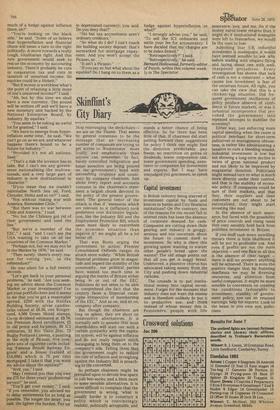Skinflint's City Diary
Stop rearranging the deckch airs we are on the Titanic. That seems by general consensus to be the message that an increasing number of companies are trying to get across to Westminster more loudly and emphatically than anyone can remember. In fact, barely controlled indignation and bitter invective are being poured on the government's head with astonishing virulence and unanimity by company chairmen. Just about every report and accounts contains in the chairman's statement a largish chunk devoted to the policy of the present government. The general tenor of the attack is that if "measures which are relevant to it (inflation) .took preference over doctinaire legislation, like the Industry Bill and the Employment Protection Bill, which seem more likely to exacerbate the economic situation than improve it" we might all be a lot better off.
That was Boots urging the government to action. Premier Consolidated Oilfields ranges its attack more widely: "While British financial problems grow in magnitude and imperil the stability of the community, our political parties have wasted too much time in arguing the merits of Britain either being in or out of the EEC. Politicians do not seem to be able to comprehend the fact that the country faces a financial catastophe irrespective of membership of the EEC." And so on, and so on, company after company.
But though the chairmen are long on spleen, they are short on constructive alternatives. It is normally safe to assume that most shareholders will start out with a certain sympathy with the capitalist system, will be against inflation and do not really require much, haranguing to bring them on to the company's side. Telling them that the government ought to reduce the rate of inflation and inveighing against the Industry Bill is preaching to the converted.
So perhaps chairmen might be prevailed upon to devote less space to yah boo sucks, and a little more to some sensible alternatives. It is never difficult to complain that the government is wrong, 'what is usually harder is to construct a policy which is convincingly realistic, politically acceptable, and • • stands a better chance of being effective. So far there has been little of that. If chairmen did start putting forward their suggestions for policy I think one might find the direction predictable: pay freeze, no restriction on prices or dividends, lower corporation tax, lower government spending, assistance to companies for investment and exports. But I may have misjudged you gentlemen, so speak up.
Capital investment
Is British industry being starved of investment capital by fools and knaves in banks and City financial institutions? On the contrary, one of the reasons for the recent fall in interest rates has been the absence of corporate demand for cash. Companies are cutting down their gearing and industry is groggy, anxious and too uncertain about the future to commit itself to investment. So why is there this growing queue wanting to scatter other people's bread upon the waters? The old adage points out that all you get is soggy bread. Undeterred, a plaintive chorus has advocated taking money from the City and pushing down industrial ratholes.
The crusade is to put institutional money into capital investment. Forget for the moment that industry does not want the money and is therefore unlikely to put it to productive use, and think instead of whose money this is. Pensioners, people with life assurance, you, and me. So if the money earns lower returns than it might do if institutional managers were left to themselves, we would be the ones to lose.
Admitting that UK industrial investment is inadequate, it would have seemed sensible to ask why before wading with slogans flying and laying about one with wellsharpened prejudices. Every investigation has shown that lack of cash is not a constraint what causes low investment is fear of the uncertain future. All right, you can take the view that this is a chicken/egg situation. Did frequent government oscillations of policy produce absence of confidence in future markets, or was it industrial incompetence that provoked the government into repeated attempts to stabilise the economy?
Either way, just enforcing more capital spending when the cause is political penchant for short-term palliatives or management obtuseness, is rather like administering a laxative to cure a bleeding wound. Industrial investment is low but not showing a long-term decline in terms of gross national product and not likely to be improved by magisterial direction. Politicians might instead turn to what is much more directly under their control, and that is the stability of economic policy. If companies could be sure of their markets, and that they, their suppliers and their customers are not about to be nationalised, they might start investing like mad.
In the absence of such assurance, but faced with the possibility of price controls and rising taxes they very sensibly hold back from pointless investment in Britain.
If you stuff cash down unwilling throats there is little likelihood it will be put to profitable use. And even if profits are not the main objective and one flaw in all this is the absence of clear target there is still no prospect anything will be achieved. There is even the ' positive danger that by fostering deadbeats we may be diverting resources, and attention from useful companies. It might be more sensible to concentate on creating the conditions fav'ourable to investment: stability of government policy, low tax on retained earnings, help for exports. Look to the beam in you own eye, politicians.


































 Previous page
Previous page